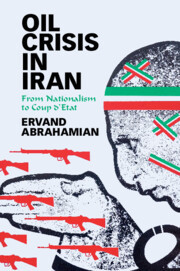Description
Oil Crisis in Iran
From Nationalism to Coup d'Etat
Author: Abrahamian Ervand
Language: English
Subject for Oil Crisis in Iran:
Approximative price 39.35 €
In Print (Delivery period: 14 days).
Add to cart
Oil Crisis in Iran
Publication date: 11-2022
Support: Print on demand
Publication date: 11-2022
Support: Print on demand
Approximative price 39.35 €
In Print (Delivery period: 14 days).
Add to cart
Oil Crisis in Iran
Publication date: 06-2021
220 p. · 15.8x23.5 cm · Hardback
Publication date: 06-2021
220 p. · 15.8x23.5 cm · Hardback
Description
/li>Contents
/li>Biography
/li>
Focusing on the turbulent twenty-eight months between April 1951 and August 1953, this book, based on recently declassified CIA and US State Department documents from the Mossadeq administration tell the story of the Iranian oil crisis, which would culminate in the coup of August 1953. Throwing fresh light on US involvement in Iran, Ervand Abrahamian reveals exactly how immersed the US was in internal Iranian politics long before the 1953 coup, in parliamentary politics and even in saving the monarchy in 1952. By weighing rival explanations for the coup, from internal discontent, a fear of communism and oil nationalization, Abrahamian shows how the Truman and Eisenhower administrations did not differ significantly in their policies towards Mossadeq, and how the surprising main obstacle to an earlier coup was the shah himself. In tracing the key involvement of the US and CIA in Iran, this study shows how the 1953 coup would eventually pave the way to the 1979 Iranian revolution, two of the most significant and widely studied episodes of modern Iranian history.
Introduction; 1. US involvement; 2. US concerns: oil or communism?; 3. Parliamentary politics; 4. The road to the coup; 5. Memory revised.
Ervand Abrahamian is Distinguished Professor Emeritus of History at Baruch College and Graduate Center, City University of New York. He is the author of several books including Iran Between Two Revolutions (1982) and A History of Modern Iran (2018). He was elected in 2010 to the American Academy of Arts and Sciences.
© 2024 LAVOISIER S.A.S.
These books may interest you

A History of Modern Iran 28.98 €



